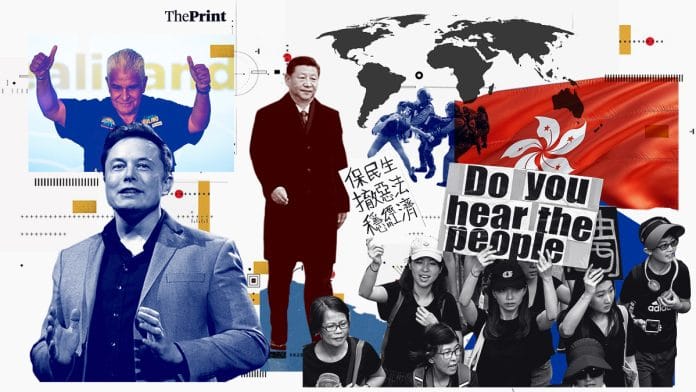New Delhi: The Hong Kong government is all set to ban a protest anthem called ‘Glory to Hong Kong’, creating alarm over the erosion of free speech.
The government can do so since Hong Kong’s Court of Appeal Wednesday overturned a lower court verdict, which last year rejected the government’s claim to term the unofficial protest anthem illegal.
The appellate court granted an interim injunction prohibiting the “broadcasting, performing, printing, publishing, selling, offering for sale, distributing, disseminating, displaying, or reproducing of the song.” Exemptions, however, have been made for academic and journalistic purposes.
‘Glory to Hong Kong’ gained prominence during the 2019 mass pro-democracy protests that saw over two million people participating against an Extradition Bill, which would have allowed extraditions to mainland China. The bill was later shelved.
Until 1997, Hong Kong remained under British colonial rule. Following that year, the region’s sovereignty was transferred to China. As part of the agreement between the UK and China, Hong Kong was assured of maintaining its distinct legal and economic frameworks.
According to Reuters, “Glory to Hong Kong” was considered an unofficial national anthem, rather than China’s “March of the Volunteers”. The song, which has lyrics such as “Liberate Hong Kong”, was banned in schools immediately in 2020.
Also Read: EU’s Meta probe, Georgians protest ‘Russia-inspired’ bill & other global news you may have missed
Elections around the world
Apart from Russia — where Vladimir Putin took oath for the fifth term as President and the West boycotted his inauguration ceremony — several other countries chose their leaders this week.
In Panama, 64-year-old former security minister Jose Raul Mulino triumphed in the Presidential election. Initially, a vice-presidential candidate, Mulino stepped up as the primary contender after his associate, Ricardo Martinelli, was disqualified due to corruption allegations. With a 34 percent vote share, Mulino’s approach to the pressing Panama Canal drought issue has gained global interest.
Earlier this week, presidential elections in the central African country, Chad, concluded with Mahamat Deby, the son of the late military leader Idriss Deby Itno, claiming victory. Idriss Deby Itno had led the country for over 30 years, from 1990 to 2021, when he was killed during a battle with rebel forces after his sixth presidential victory.
The 40-year-old, Mahamat, garnered 61.3 percent votes, significantly outpacing the incumbent Prime Minister Succès Masra, who received 18.53 percent.
In Europe, Internal Macedonian Revolutionary Organization-Democratic Party for Macedonian Unity (VMRO-DPMNE) — a right-wing and long-term Opposition party — won North Macedonia’s elections Wednesday. The nation made history by electing its first female president, Gordana Siljanovska-Davkova, an Independent candidate supported by VMRO-DPMNE.
A university professor and lawyer, Siljanovska-Davkova has reportedly expressed scepticism regarding the Prespa Agreement, which facilitated the country’s name change from Macedonia to North Macedonia and Western integration.
Meanwhile, Lithuania is poised for its presidential election this Sunday, with eight candidates vying for the position. The election is deemed significant against the backdrop of the ongoing Russia-Ukraine conflict and the geopolitical tensions between Russia and the West.
Voting also took place in Iran Friday in a run-off election to elect the remaining Members of Parliament, with 22 constituencies selecting 45 representatives from a pool of 90 candidates. The counting has commenced, and the results are anticipated by Monday.
Musk vs Australia
Tesla CEO Elon Musk is currently engaged in a legal dispute with the Australian government regarding the worldwide deletion of specific violent content on ‘X’ (formerly Twitter).
The contention arose after Musk opposed a directive from the e-Safety Commissioner, which demanded the removal of 65 posts linked to an assault on an Assyrian Christian bishop in Sydney.
While the social media platform has agreed to geoblocking Australian users from viewing the disputed content, the Australian authorities are insisting on a global take-down under the nation’s Online Safety Act. The government claims that Australian citizens can circumvent geoblocking by employing VPN services.
Meanwhile, platforms like Meta have complied with the government’s request for immediate content removal.
While ‘X’ harps on free speech, the Australian legal argument is that it is not a free speech debate but is “about the application of the Online Safety Act and the provisions of that act prepared by the parliament.”
Xi Jinping visits Europe, here’s what happened
During a significant five-day European tour this week, Chinese President Xi Jinping visited ‘cherry-picked’ three nations — France, Serbia, and Hungary — that have shown alignment with China’s vision for a new global order.
This tour coincided with several key anniversaries — 60 years of diplomatic relations with France, 75 years with Hungary, and 25 years since the NATO bombing of the Chinese embassy in Belgrade amid the Kosovo conflict.
Xi Jinping also met European Commission president Ursula von der Leyen.
In his efforts to demonstrate China’s active engagement with Europe, Xi highlighted the relationships with Serbia and Hungary.
He reportedly said “Belgrade is an example for China’s friendly relations with other European countries,” and “China supports Hungary in playing a bigger role in the EU and promoting greater progress in China-EU relations”.
Meanwhile, Xi also signed multiple deals in these two countries, including infrastructure and investment deals, and notably, a nuclear cooperation agreement with Hungary.
While in France, despite the lack of agreement on the Ukraine conflict and trade matters, the joint meeting between Xi, French President Macron, and Ursula von der Leyen suggested a likely potential for enhanced collaboration with a more unified Europe.
According to an Aljazeera report, the meeting also reinforced the personal relationship between Macron and Xi, with both leaders sharing a mutual unease with the US hegemonic influence.
(Edited by Richa Mishra)
Also Read: Singapore’s next PM, South America’s drought crisis & other global news you may have missed






